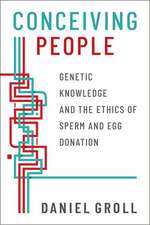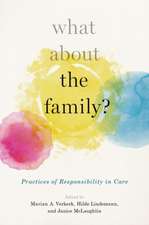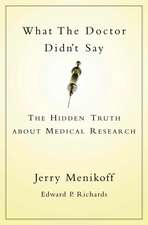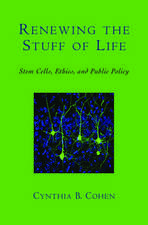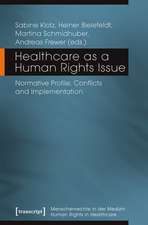The Routledge Handbook of the Philosophy of Paternalism: Routledge Handbooks in Applied Ethics
Editat de Kalle Grill, Jason Hannaen Limba Engleză Paperback – 18 dec 2020
• What is Paternalism?
• Paternalism and Ethical Theory
• Paternalism and Political Philosophy
• Paternalism without Coercion
• Paternalism in Practice
Within these sections central debates, issues and questions are examined, including: how should paternalism be defined or characterized? How is paternalism related to such moral notions as rights, well-being, and autonomy? When is paternalism morally objectionable? What are the legitimate limits of government benevolence? To what extent should medical practice be paternalistic?
The Routledge Handbook of the Philosophy of Paternalism is essential reading for students and researchers in applied ethics and political philosophy. The handbook will also be very useful for those in related fields, such as law, medicine, sociology and political science.
| Toate formatele și edițiile | Preț | Express |
|---|---|---|
| Paperback (1) | 416.22 lei 6-8 săpt. | |
| Taylor & Francis – 18 dec 2020 | 416.22 lei 6-8 săpt. | |
| Hardback (1) | 1215.28 lei 6-8 săpt. | |
| Taylor & Francis – 24 ian 2018 | 1215.28 lei 6-8 săpt. |
Preț: 416.22 lei
Nou
Puncte Express: 624
Preț estimativ în valută:
79.65€ • 83.54$ • 66.30£
79.65€ • 83.54$ • 66.30£
Carte tipărită la comandă
Livrare economică 01-15 aprilie
Preluare comenzi: 021 569.72.76
Specificații
ISBN-13: 9780367735364
ISBN-10: 0367735369
Pagini: 376
Dimensiuni: 174 x 246 x 20 mm
Greutate: 0.45 kg
Ediția:1
Editura: Taylor & Francis
Colecția Routledge
Seria Routledge Handbooks in Applied Ethics
Locul publicării:Oxford, United Kingdom
ISBN-10: 0367735369
Pagini: 376
Dimensiuni: 174 x 246 x 20 mm
Greutate: 0.45 kg
Ediția:1
Editura: Taylor & Francis
Colecția Routledge
Seria Routledge Handbooks in Applied Ethics
Locul publicării:Oxford, United Kingdom
Public țintă
Postgraduate and UndergraduateCuprins
Introduction: Jason Hanna and Kalle Grill
A. What is Paternalism?
Index
A. What is Paternalism?
- The Concept of Paternalism: Danny Scoccia (New Mexico State University)
- Hard and Soft Paternalism: Jason Hanna (Northern Illinois University)
- Moralism and Moral Paternalism: Peter de Marneffe (Arizona State University)
- Paternalism by and towards Groups: Kalle Grill (Umeå University)
- Self-Paternalism: Chrisoula Andreou (University of Utah)
B. Paternalism and Ethical Theory - Paternalism and Well-Being: Jason Raibley (California State University, Long Beach)
- Consequentialism, Paternalism, and the Value of Liberty: Sarah Conly (Bowdoin College)
- Kantian Perspectives on Paternalism: Melissa Seymour Fahmy (University of Georgia)
- Paternalism and Duties to Self: Michael Cholbi (California State Polytechnic Univ, Pomona)
- Paternalism and Rights: Daniel Groll (Carleton College)
- Paternalism and Sentimentalism: Michael Slote (University of Miami)
- Paternalism and Autonomy: Suzy Killmister (Monash University, Australia)
C. Paternalism and Political Philosophy - Mill’s Absolute Ban on Paternalism: Jonathan Riley (Tulane University)
- Perfectionism and Paternalism: Steven Wall (University of Arizona)
- Libertarian Perspectives on Paternalism: Peter Vallentyne (University of Missouri)
- Egalitarian Perspectives on Paternalism: Richard Arneson (University of California, San Diego)
- Should the Capability Approach be Paternalistic? Serene Khader (Brooklyn College and CUNY Graduate Center)
D. Paternalism Without Coercion - Libertarian Paternalism, Nudging and Public Policy: Muireann Quigley (Newcastle Law School)
- Paternalistic Manipulation: Moti Gorin (Colorado State University)
- Paternalistic Lying and Deception: Andreas Stokke (Swedish Collegium for Advanced Study, Uppsala University)
- Epistemic Paternalism: Kristoffer Ahlstrom-Vij (Birkbeck College, University of London)
E. Paternalism in Practice - Paternalism and the Criminal Law: Heidi Hurd (University of Illinois)
- Paternalism and Contract Law: Péter Cserne (University of Hull)
- Paternalism and the Practitioner/Patient Relationship: Emma C. Bullock (Central European University)
- Deciding for the Incompetent: Dana Howard (Dept. of Bioethics, NIH)
- Paternalism and Education: Gina Schouten (Harvard University)
- Paternalism and Intimate Relationships: George Tsai (University of Hawaii)
Index
Notă biografică
Kalle Grill is Associate Professor of Philosophy at Umeå University, Sweden. His research mainly concerns paternalism and related issues, such as nudging, respect for preferences, and various issues in public health policy. He also works on population ethics.
Jason Hanna is Associate Professor of Philosophy at Northern Illinois University, USA. His research addresses issues in normative and applied ethics, including the permissibility of paternalism and the defensibility of deontological constraints on harming. He has previously held a Faculty Fellowship at Tulane University's Murphy Institute.
Jason Hanna is Associate Professor of Philosophy at Northern Illinois University, USA. His research addresses issues in normative and applied ethics, including the permissibility of paternalism and the defensibility of deontological constraints on harming. He has previously held a Faculty Fellowship at Tulane University's Murphy Institute.
Recenzii
'This volume is a comprehensive treatment of all aspects of paternalism. The contributions are of high quality and topics are covered which are often neglected, e.g. nudging, manipulation, epistemic paternalism.'
Gerald Dworkin, University of California, Davis, USA
Gerald Dworkin, University of California, Davis, USA
Descriere
Descriere de la o altă ediție sau format:
The handbook covers the following questions: how should paternalism be defined or characterized? How is paternalism related to such moral notions as rights, well-being, and autonomy? When is paternalism morally objectionable? What are the legitimate limits of government benevolence? To what extent should medical practice be paternalistic?
The handbook covers the following questions: how should paternalism be defined or characterized? How is paternalism related to such moral notions as rights, well-being, and autonomy? When is paternalism morally objectionable? What are the legitimate limits of government benevolence? To what extent should medical practice be paternalistic?
















